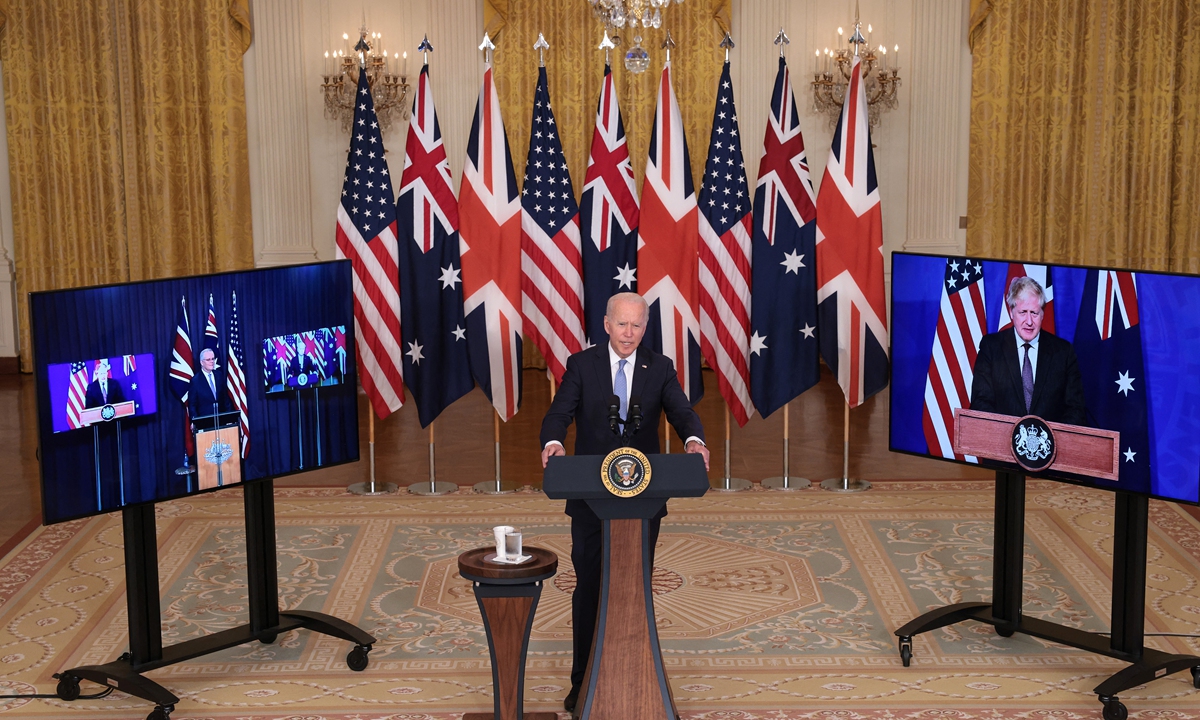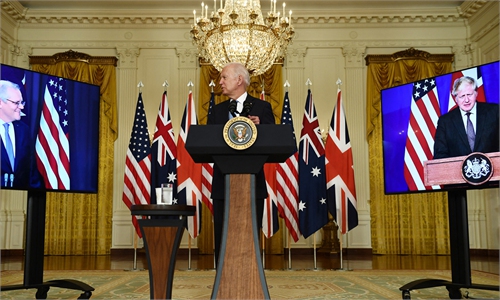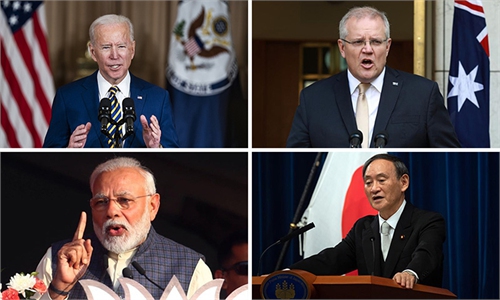
US President Joe Biden speaks during an event in the East Room of the White House on September 15, 2021 in Washington, DC. Biden announced a new national security initiative in partnership with Australian Prime Minister Scott Morrison (L) and UK Prime Minister Boris Johnson (R). Photo: AFP
On Friday, France recalled its ambassadors to the US and Australia after feeling "a stab in the back," as Canberra decided to rip up a submarine deal with Paris under the guise of AUKUS, a newly formed trilateral security partnership between the US, UK, and Australia.What was originally a commercial dispute has become a crisis of trust between Western allies. And it once again demonstrates Washington's unilateral thinking and approach. Despite US President Joe Biden promising a return to multilateralism and close cooperation with its allies, his administration is plotting a weird course in the opposite direction.
It also shows that the US is getting increasingly impatient when it comes to attempt to show strength through its so-called Indo-Pacific strategy. Now it has not only undermined the cooperation of its allies, but also got around nuclear non-proliferation, a problem the international community is greatly concerned about. Many countries worry that exporting nuclear technology to non-nuclear-states like Australia is harmful to peace in the region and the world.
Apart from France feeling a sense of betrayal and Europe questioning mutual trust with the US, NATO has also taken a stand regarding this issue. It claimed that the current clash will not have an impact on military cooperation within NATO. However, whether the conflict will spread depends on how the two sides will interact next.
NATO now has many internal problems that need to be addressed, and the relationship between Europe and the US is still in a process of repair in a post-Trump world. This latest US-France dispute adds up to already delicate transatlantic relations. If the differences cannot be managed, there is concern that this distrust will eventually deepen and spread to other areas.
If the US is smart enough, it will try to control the rift, making it an issue simply between the US and France, not between the US and Europe or within NATO. This dispute should also be left to the Indo-Pacific strategy, not in other areas. To be more specific, if Washington is willing to take some losses and compensate Paris, then the damage might be controlled. Otherwise, it will certainly damage the mutual trust between the US and its European allies, as well as the unity within NATO.
As the US shifts the focus of its global security strategy to the Indo-Pacific region, not all of its existing partnerships will be useful. Washington is eager to "sharpen" its Indo-Pacific strategy. In other words, it aims to find a grip that can truly help it realize its Indo-Pacific strategy, especially in the security field.
Meanwhile, NATO, at least for now, cannot play much of a role, given its main focus is still in Europe. And if NATO extends itself too far from Europe, most of its member states will find it difficult to follow up.
In addition to finding a useful partnership, the Biden administration also wants to set AUKUS as an example. If the trilateral partnership does share nuclear technology with Australia in the future, then there is the possibility that the US will extend it to countries like India.
All in all, whether the US can replicate or extend the AUKUS model to other countries depends on how it deals with the current dispute with France. It is believed that Washington is seeking to settle the dispute as soon as possible. Otherwise, its hope to make AUKUS an example will become vague.
The author is director of the Department of European Studies, China Institute of International Studies. opinion@globaltimes.com.cn



